My Top 10 Non-D&D RPGs (Part I)
In a comment to a recent post, I was asked to put together a Top 10 list of my favorite non-D&D RPGs. I thought that was a good idea and today's post is the first half of that list. In putting the list together, I spent some time reflecting on which games I both liked and had played extensively over the course of my time in the hobby. Most of the results were obvious, but a handful surprised me. For this two-part post, I've kept the entries brief. However, I may return to several of them in separate posts where I talk at greater length about my experiences with these games and why I would rank them among my favorites.
Part II will appear tomorrow.
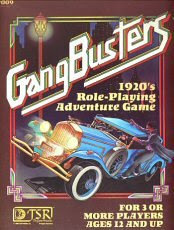 10. Gangbusters
10. Gangbusters
I've always liked the idea of historical RPGs, but, in practice, they're often difficult to pull off. One of their biggest obstacles in my opinion is that players – and referees too – are often at a loss deciding precisely what to do in a past setting. That's not the case with TSR's Gangbusters. For one, it takes place during the gang wars of the USA's Prohibition Era, which naturally lends itself to something more akin to the "adventuring" found in purely fictional worlds. For another, the game's compact 64-page rules give plenty of rules and advice on how to run a campaign. Everything from police procedures to investigative journalism to criminal activities gets its due. Gangbusters is the only historical RPG I've ever played successfully for any length of time and I regularly consider trying to do so again. It's a terrific, underappreciated gem of the first decade of the hobby.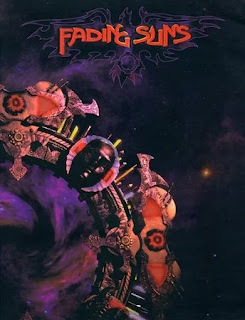
9. Fading Suns
Science fiction has always been my jam, so I don't think anyone will be surprised to see a large number of SF RPGs on this list. That said, Fading Suns is science fiction in the same way that one might call Star Wars science fiction, which is to say, it involves blasters and starships but is otherwise more of a space fantasy. That's not a criticism of Fading Suns, which makes excellent use of a number of thematic and setting elements that are right up my alley, like religion, ancient mysteries, weird technology, feudalism, and more. The game's setting has always been its main strength, since it's never had a rules system with which I was wholly comfortable. Even so, I've had a lot of fun with it over the years, having run a couple of enjoyable campaigns in the late '90s and early 2000s. I hope one day to do it again.
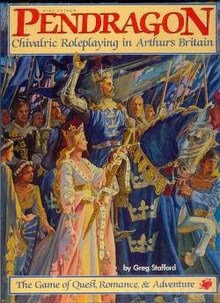 8. Pendragon
8. Pendragon
Pendragon is one of only a handful of RPGs I'd consider "perfect," in the sense that they perfectly marry their mechanics and subject matter. It's for this reason that the game is sometimes considered the late Greg Stafford's masterpiece and I largely agree with that judgment. Stafford managed to achieve with Pendragon something he never quite managed with RuneQuest: the creation of rules that fully immersed the player into the world – and worldview – of the game. That Pendragon's mechanics are quite simple (and mostly straightforward) makes it very easy on both players and the referee to enter a fully realized Arthurian world. I recently had the chance to play Pendragon again over the last couple of years and enjoyed myself greatly. The game remains every bit as good as I remembered its being.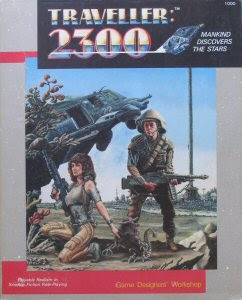
7. Traveller: 2300
Science fiction rears its head again. Traveller: 2300 – later renamed 2300 AD to avoid confusion with its unrelated predecessor – is a game I strongly associate with the last years of high school and the start of my college education. During those years, I was much devoted to it, in large part because I found its setting so compelling. From its interesting (and unexpected) future history to its plausible future technologies to its truly alien aliens, it had everything that I wanted in a SF RPG at the time. Like many other games on this list, Traveller: 2300 suffered a little because of its clunky rules, but it more than made up for it with its compelling vision of a future three centuries hence. I haven't played in this particular SF sandbox in a long time; perhaps I need to change that in the years to come.
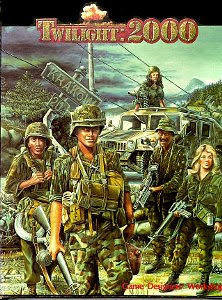 6. Twilight: 2000
6. Twilight: 2000
At the time it was released, just as I was starting high school, Twilight: 2000 seemed like a fairly plausible take on the End of the World, certainly when compared to more fanciful post-apocalyptic games like Gamma World. Strangely, that was a big part of the game's appeal to me. Later, it was the way the game and its supplements emphasized the importance of rebuilding civilization after the destruction of World War III that held my attention, making it one of the more hopeful post-apocalyptic RPGs. Twilight: 2000 is one of only a few games on this last that I am currently playing and, in its current iteration, is now firmly within the realm of alternate history (I hope). We've been having a lot of fun with it and I intend to talk more about my experiences with it in future posts.
Part II will appear tomorrow.
 10. Gangbusters
10. Gangbusters
I've always liked the idea of historical RPGs, but, in practice, they're often difficult to pull off. One of their biggest obstacles in my opinion is that players – and referees too – are often at a loss deciding precisely what to do in a past setting. That's not the case with TSR's Gangbusters. For one, it takes place during the gang wars of the USA's Prohibition Era, which naturally lends itself to something more akin to the "adventuring" found in purely fictional worlds. For another, the game's compact 64-page rules give plenty of rules and advice on how to run a campaign. Everything from police procedures to investigative journalism to criminal activities gets its due. Gangbusters is the only historical RPG I've ever played successfully for any length of time and I regularly consider trying to do so again. It's a terrific, underappreciated gem of the first decade of the hobby.

9. Fading Suns
Science fiction has always been my jam, so I don't think anyone will be surprised to see a large number of SF RPGs on this list. That said, Fading Suns is science fiction in the same way that one might call Star Wars science fiction, which is to say, it involves blasters and starships but is otherwise more of a space fantasy. That's not a criticism of Fading Suns, which makes excellent use of a number of thematic and setting elements that are right up my alley, like religion, ancient mysteries, weird technology, feudalism, and more. The game's setting has always been its main strength, since it's never had a rules system with which I was wholly comfortable. Even so, I've had a lot of fun with it over the years, having run a couple of enjoyable campaigns in the late '90s and early 2000s. I hope one day to do it again.
 8. Pendragon
8. PendragonPendragon is one of only a handful of RPGs I'd consider "perfect," in the sense that they perfectly marry their mechanics and subject matter. It's for this reason that the game is sometimes considered the late Greg Stafford's masterpiece and I largely agree with that judgment. Stafford managed to achieve with Pendragon something he never quite managed with RuneQuest: the creation of rules that fully immersed the player into the world – and worldview – of the game. That Pendragon's mechanics are quite simple (and mostly straightforward) makes it very easy on both players and the referee to enter a fully realized Arthurian world. I recently had the chance to play Pendragon again over the last couple of years and enjoyed myself greatly. The game remains every bit as good as I remembered its being.

7. Traveller: 2300
Science fiction rears its head again. Traveller: 2300 – later renamed 2300 AD to avoid confusion with its unrelated predecessor – is a game I strongly associate with the last years of high school and the start of my college education. During those years, I was much devoted to it, in large part because I found its setting so compelling. From its interesting (and unexpected) future history to its plausible future technologies to its truly alien aliens, it had everything that I wanted in a SF RPG at the time. Like many other games on this list, Traveller: 2300 suffered a little because of its clunky rules, but it more than made up for it with its compelling vision of a future three centuries hence. I haven't played in this particular SF sandbox in a long time; perhaps I need to change that in the years to come.
 6. Twilight: 2000
6. Twilight: 2000At the time it was released, just as I was starting high school, Twilight: 2000 seemed like a fairly plausible take on the End of the World, certainly when compared to more fanciful post-apocalyptic games like Gamma World. Strangely, that was a big part of the game's appeal to me. Later, it was the way the game and its supplements emphasized the importance of rebuilding civilization after the destruction of World War III that held my attention, making it one of the more hopeful post-apocalyptic RPGs. Twilight: 2000 is one of only a few games on this last that I am currently playing and, in its current iteration, is now firmly within the realm of alternate history (I hope). We've been having a lot of fun with it and I intend to talk more about my experiences with it in future posts.
Published on February 16, 2023 10:13
No comments have been added yet.
James Maliszewski's Blog
- James Maliszewski's profile
- 3 followers
James Maliszewski isn't a Goodreads Author
(yet),
but they
do have a blog,
so here are some recent posts imported from
their feed.



